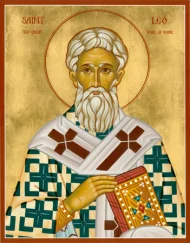 Continued from here….
Continued from here….
As regards those who follow this Leader [Christ], their nature does not admit of an exact and entire imitation [in baptism].
Rather, it receives now as much as it is capable of receiving, while it reserves the remainder for the time that comes after.
In what, then, does this imitation consist?
It consists in the effecting the suppression of that admixture of sin, in the figure of mortification that is given by the water:
not certainly a complete effacement, but a kind of break in the continuity of the evil, two things concurring to this removal of sin—the penitence of the transgressor and his imitation of the death.
By these two things the man is in a measure freed from his congenital tendency to evil; by his penitence he advances to a hatred of and averseness from sin, and by his death he works out the suppression of the evil.
But had it been possible for him in his imitation to undergo a complete dying, the result would be not imitation but identity; and the evil of our nature would so entirely vanish that, as the Apostle says, “he would die unto sin once for all” (cf. Rom. 6:10).
[…] We only so far imitate the transcendent Power as the poverty of our nature is capable of, by having the water thrice poured on us and ascending again up from the water, we enact that saving burial and resurrection which took place on the third day, with this thought in our mind, that as we have power over the water both to be in it and arise out of it.
So also, He, Who has the universe at His sovereign disposal, immersed Himself in death, as we in the water, to return to His own blessedness.
If, therefore, one looks to that which is in reason, and judges of the results according to the power inherent in either party, one will discover no disproportion in these results, each in proportion to the measure of his natural power working out the effects that are within his reach.
For, as it is in the power of man, if he is so disposed, to touch the water and yet be safe, with infinitely greater ease may death be handled by the Divine Power so as to be in it and yet not to be changed by it injuriously.
Observe, then, that it is necessary for us to rehearse beforehand in the water the grace of the resurrection, to the intent that we may understand that, as far as facility goes, it is the same thing for us to be baptized with water and to rise again from death.
Gregory of Nyssa (c 335 – after 394): The Great Catechism, 35 (slightly adapted).








